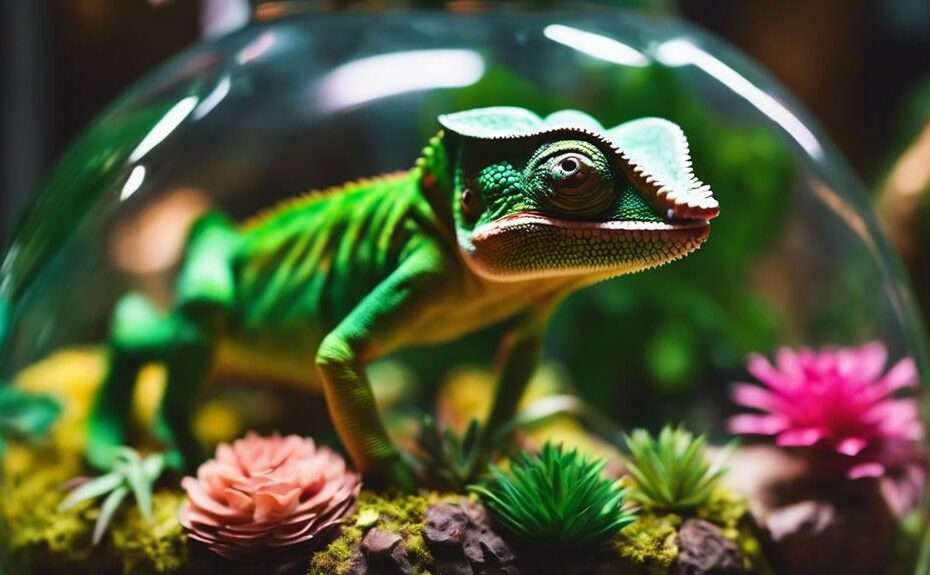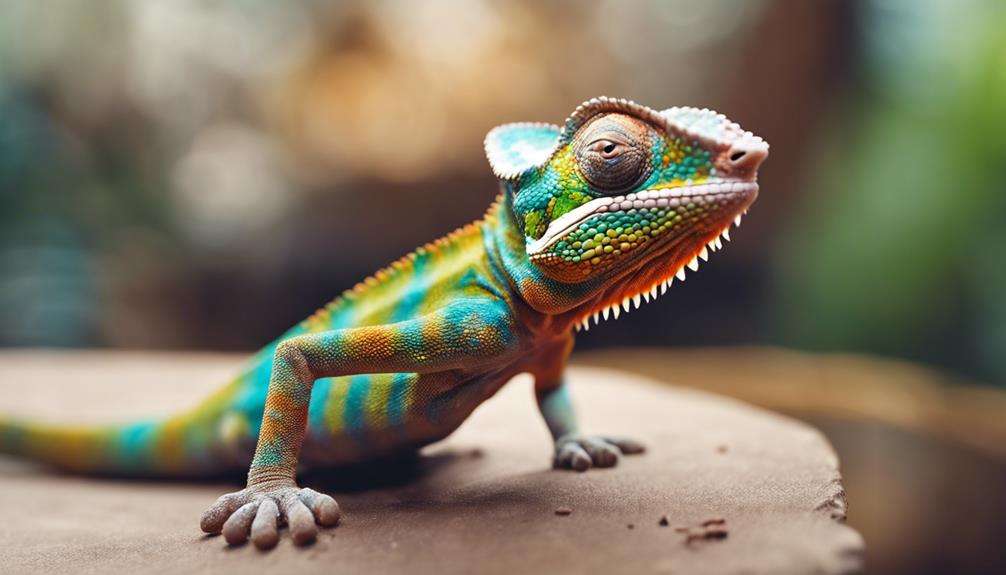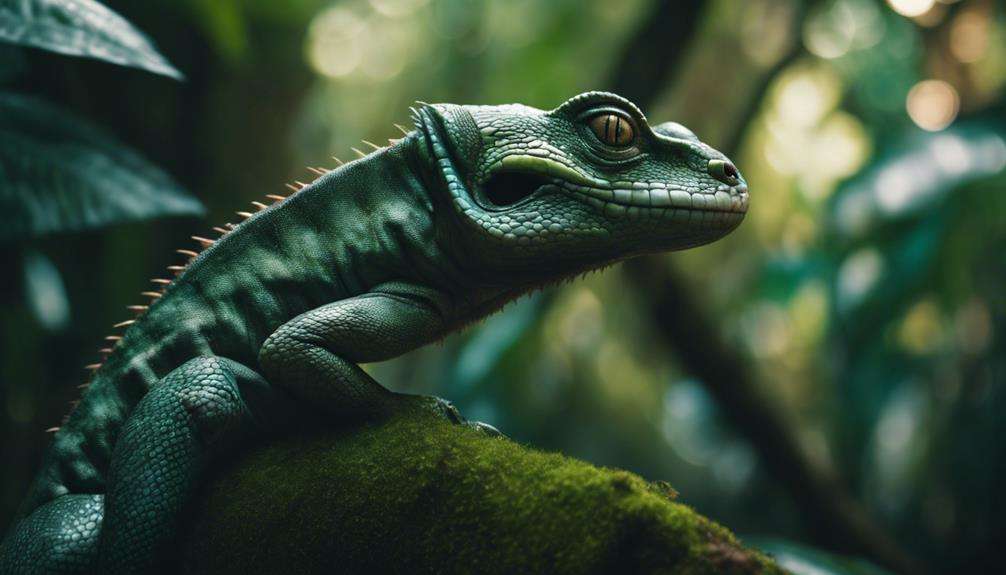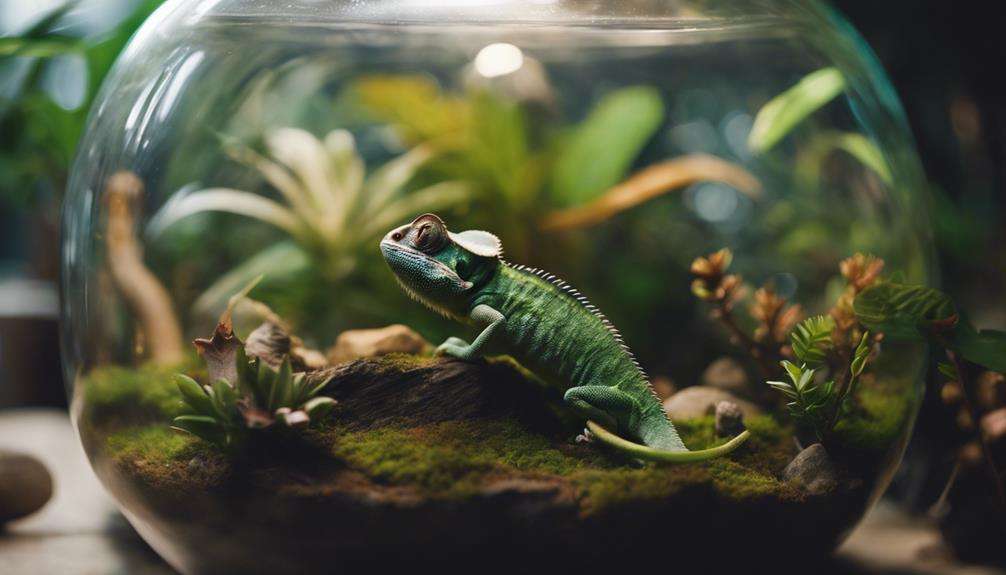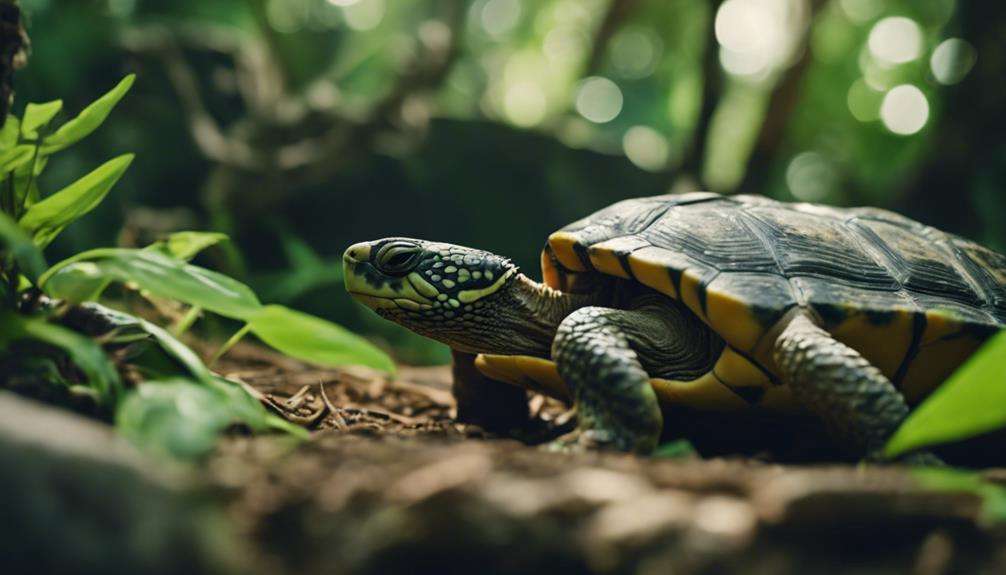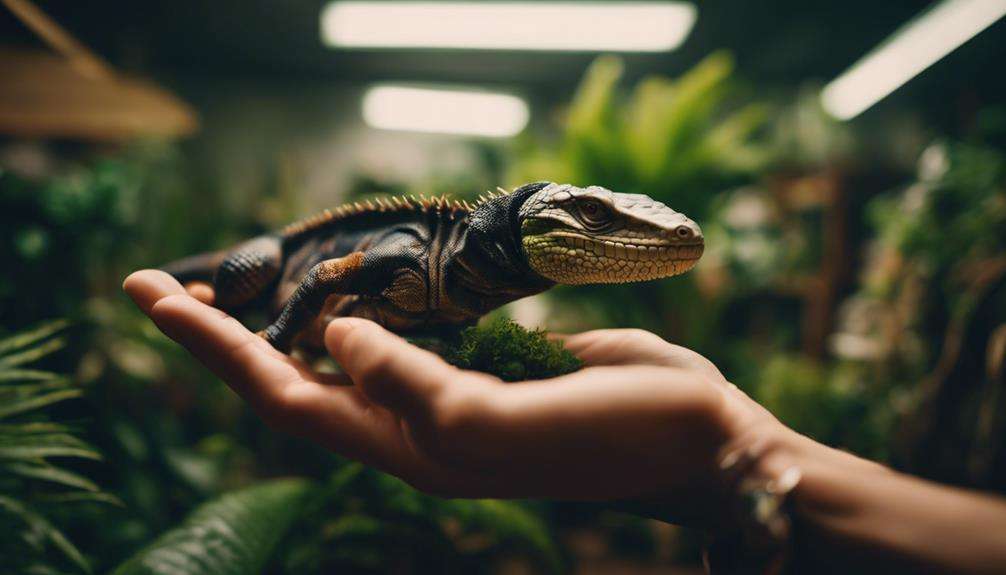When it comes to caring for unusual exotic reptiles, you're embarking on a journey into the fascinating world of unique creatures that demand specialized attention. From understanding their intricate habitat needs to providing tailored nutrition and safe handling, there are essential tips to consider.
But what about the nuances of their social interactions and early health indicators? Stay tuned to uncover the key insights that will enhance your exotic reptile caregiving skills and ensure a fulfilling experience with these extraordinary pets.
Key Takeaways
- Understand and meet species-specific care requirements for optimal health.
- Provide tailored diets and feeding schedules mimicking natural food sources.
- Ensure regular veterinary care, hygiene maintenance, and environmental enrichment.
- Monitor health closely for early detection of illness and prompt intervention.
Unique Exotic Reptile Selection
When considering unique exotic reptiles for ownership, it's essential to research and understand their specific care requirements thoroughly. Unusual exotic pets like frilled dragons, uromastyx lizards, and pancake tortoises have distinct dietary needs and habitat preferences that must be met to ensure their well-being. These uncommon exotic reptiles often require specialized care compared to more common species, making it crucial for prospective owners to educate themselves on the unique demands of these fascinating creatures.
For example, frilled dragons thrive in large enclosures with ample climbing opportunities and UVB lighting to mimic their natural Australian habitat. Uromastyx lizards, on the other hand, have specific dietary requirements, including a diet rich in leafy greens and limited fruit to maintain their health. Pancake tortoises need warm, dry environments with access to hiding spots to feel secure.
Understanding and catering to the care requirements of these unusual exotic reptiles is essential for their overall well-being and longevity in captivity. By providing a suitable habitat and meeting their dietary needs, you can ensure a fulfilling and enriching experience as a responsible exotic pet owner.
Specialized Habitat Setup
To ensure the well-being of your exotic reptile, creating a specialized habitat setup that caters to their specific temperature, humidity, and dietary needs is imperative. Exotic pets need precise temperature ranges to thrive. Research the ideal temperature for your reptile species and provide heat sources like heat lamps or heating pads to create temperature gradients within the enclosure.
High humidity levels are crucial for many exotic reptiles to mimic their natural environment and support proper shedding and respiratory functions. Invest in a quality hygrometer to monitor humidity levels accurately.
Additionally, a balanced diet tailored to your reptile's species is essential for their overall health and longevity. Consult with a veterinarian or exotic pet specialist to determine the appropriate diet and feeding schedule.
Tailored Nutritional Requirements

To ensure the health and longevity of your exotic reptile, it's essential to understand their unique dietary needs and establish specialized feeding schedules. Different species require specific nutrients to thrive, like insectivorous diets for geckos and herbivorous diets for tortoises.
Tailoring their nutrition to mimic their natural diet is key in providing the best care for your exotic reptile.
Unique Dietary Needs
Exotic reptiles possess unique dietary needs tailored to their species, emphasizing the importance of providing a varied and specific diet to ensure their optimal health and well-being. Different species have specific dietary requirements; iguanas, for instance, thrive on a diet rich in fresh vegetables and fruits.
Chameleons, on the other hand, require live insects like crickets and mealworms for optimal health. Snakes such as ball pythons need appropriately sized rodents like mice or rats. Tortoises have their own dietary needs, including dark leafy greens, vegetables, and occasional fruits. Geckos, like leopard geckos, benefit from a diet of live insects such as crickets and mealworms supplemented with calcium and vitamins.
Meeting these nutritional needs is crucial for the overall health and well-being of these unique exotic reptiles.
Specialized Feeding Schedules
Understanding the tailored nutritional requirements of your exotic reptile is essential for designing specialized feeding schedules that promote their health and well-being. Each species has specific needs that must be met for them to thrive.
Chameleons, for example, require a diet consisting mainly of live insects like crickets and occasional fruits. Snakes such as ball pythons thrive on a diet of frozen-thawed rodents. Geckos need a varied diet of insects, fruits, and even commercially available gecko diet to stay healthy. Bearded dragons benefit from a diet rich in insects, leafy greens, and vegetables.
Researching and understanding the specific nutritional needs of your exotic reptile is crucial for creating feeding schedules that cater to their unique dietary requirements.
Customized Veterinary Care Needs
When caring for exotic reptiles, it's crucial to provide customized veterinary care tailored to their unique species, size, behavior, and habitat requirements. Each exotic species has specific veterinary care needs that must be met to ensure their health and well-being. Specialized veterinary care for these reptiles includes diagnostic imaging, blood tests, nutritional assessments, and parasite screenings. Veterinarians may require specialized equipment such as endoscopes, ultrasound machines, and surgical tools to provide the necessary care.
Regular check-ups are essential for exotic reptiles to monitor their health, detect early signs of illness, and provide preventive care. Customized veterinary care not only helps in treating any health issues promptly but also ensures the overall well-being, longevity, and quality of life of these unique creatures in captivity. By working closely with a veterinarian experienced in exotic species care, you can provide the best possible veterinary attention for your unusual reptile companions.
Safe Handling Techniques
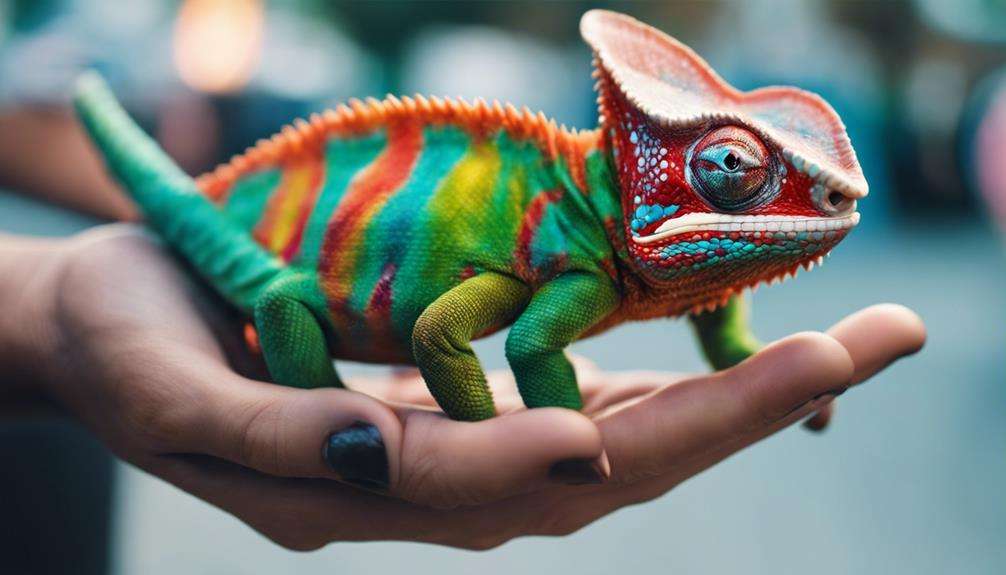
To ensure the safety and well-being of exotic reptiles during handling, always support their body weight evenly to prevent stress or injury. Exotic reptiles can become easily stressed, so it's crucial to handle them gently and avoid sudden movements or loud noises that could frighten them.
When dealing with venomous or larger reptiles, using proper tools like snake hooks or tongs is essential for your safety and theirs. Additionally, washing your hands thoroughly before and after handling exotic reptiles is vital to prevent the potential transmission of diseases between you and your scaly companions.
Seeking advice from experienced herpetologists or reptile experts on specific handling techniques for different species can provide valuable insights and ensure that you're caring for your exotic reptiles in the best way possible. By following these safe handling techniques, you can create a positive and stress-free experience for both yourself and your unique reptile friends.
Enrichment Activities for Stimulation
When caring for exotic reptiles, you can enhance their well-being by engaging them in creative habitat setups and interactive feeding techniques.
These activities are designed to stimulate their natural instincts and keep them mentally and physically active.
Creative Habitat Setups
Creating engaging and stimulating habitat setups for your exotic reptiles involves incorporating climbing structures, natural substrates, interactive toys, edible plants, and regular environmental enrichment rotations to ensure their mental well-being and natural behaviors are nurtured.
- Climbing Structures: Provide branches and hides for arboreal reptiles like chameleons to mimic their natural environment.
- Natural Substrates: Use coconut fiber or moss to encourage natural behaviors and create a habitat similar to their native surroundings.
- Interactive Toys: Offer puzzle feeders or basking platforms to keep your exotic reptile mentally engaged and physically active.
- Edible Plants: Include vegetation for foraging opportunities and a more naturalistic habitat.
Remember to rotate and change these elements regularly to maintain mental stimulation and prevent habituation for your exotic reptile.
Interactive Feeding Techniques
Engaging with your exotic reptile through interactive feeding techniques can provide essential mental stimulation and enrichment for their overall well-being and natural behaviors.
Interactive feeding techniques for exotic reptiles involve using puzzle feeders or hiding insects in the enclosure to stimulate their natural hunting instincts. Providing live prey, like insects or small rodents, can engage their predatory instincts and offer mental stimulation during feeding.
Encouraging foraging behavior by scattering food items around the habitat or using food-dispensing toys can promote physical activity and mental engagement. Additionally, utilizing feeding enrichment tools such as slow feeder bowls or food puzzles can prevent boredom and encourage problem-solving skills in your exotic reptile.
Remember to rotate feeding methods and introduce variety in prey items to keep them mentally stimulated and prevent food monotony.
Hygiene Practices for Reptiles
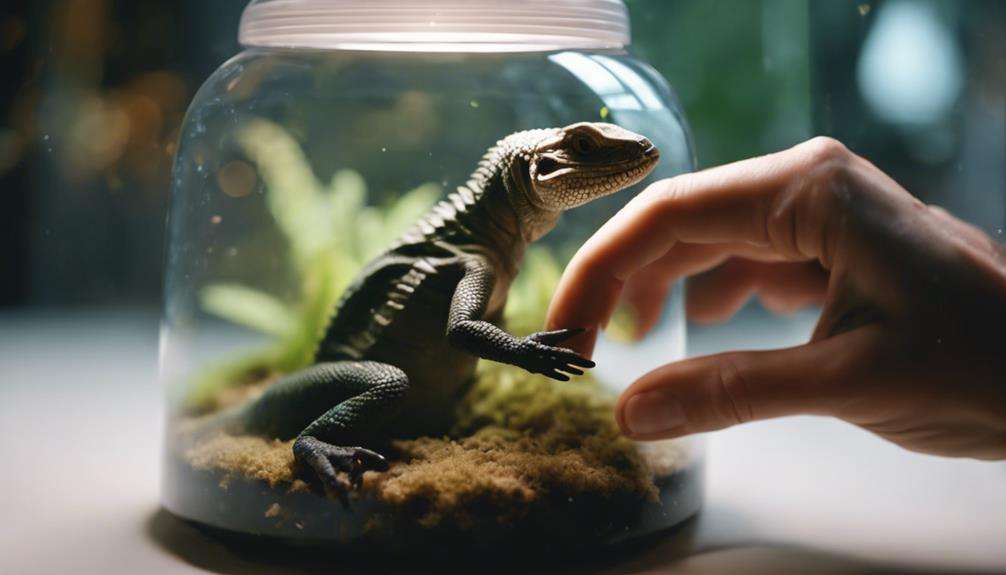
To maintain optimal health for your exotic reptile, diligent hygiene practices must be consistently implemented. Ensuring a clean environment is crucial in preventing illnesses and promoting your reptile's well-being. Here are some essential hygiene practices to follow:
- Regularly clean the reptile habitats, accessories, feeding dishes, and water bowls to eliminate any bacteria or parasites that could harm your pet.
- Promptly remove uneaten food, feces, and shedding skin from the enclosure to maintain cleanliness and prevent the buildup of harmful substances.
- Use reptile-safe disinfectants to sanitize the enclosure and accessories regularly, ensuring a hygienic environment for your reptile to thrive.
- Prevent the growth of harmful bacteria by maintaining a clean and sanitized living space for your exotic reptile, reducing the risk of infections and diseases.
Social Needs of Unusual Reptiles
Unusual reptiles, such as the Green Anole, can benefit from living in small groups where they can engage in social interactions. Species like the Chinese Water Dragon thrive with a companion to provide mental stimulation and social engagement.
However, some reptiles like the Blue-Tongued Skink may display territorial behavior and should be housed separately to prevent conflicts.
Group Housing Benefits
For unusual reptiles, group housing can be a vital aspect of their well-being, offering social interaction and companionship essential for their natural behaviors and social hierarchies to thrive. When considering the benefits of group housing for unusual reptiles, keep in mind:
- Social Interaction: Group housing allows unusual reptiles to engage in social behaviors, fostering a sense of community.
- Companionship: Having companions around can reduce stress and prevent loneliness in social species of unusual reptiles.
- Natural Behaviors: Group settings enable unusual reptiles to exhibit their natural behaviors and social hierarchies.
- Compatibility: It's crucial to monitor group dynamics and ensure compatibility among group-housed unusual reptiles to maintain harmony.
Communication Through Behavior
In understanding the social needs of exotic reptiles, observing their communication through behavior is key to providing for their well-being and ensuring a fulfilling environment. Unusual exotic reptiles exhibit various social behaviors such as basking together or engaging in courtship rituals. Some species form hierarchical structures within their groups, emphasizing the importance of social interactions.
Understanding their body language and vocalizations can provide insights into their social needs and preferences. To promote social interactions among exotic reptiles, providing hiding spots and basking areas is crucial. Additionally, environmental enrichment through toys or structures can encourage and stimulate social behaviors, contributing to their overall well-being.
Early Illness Detection Signs
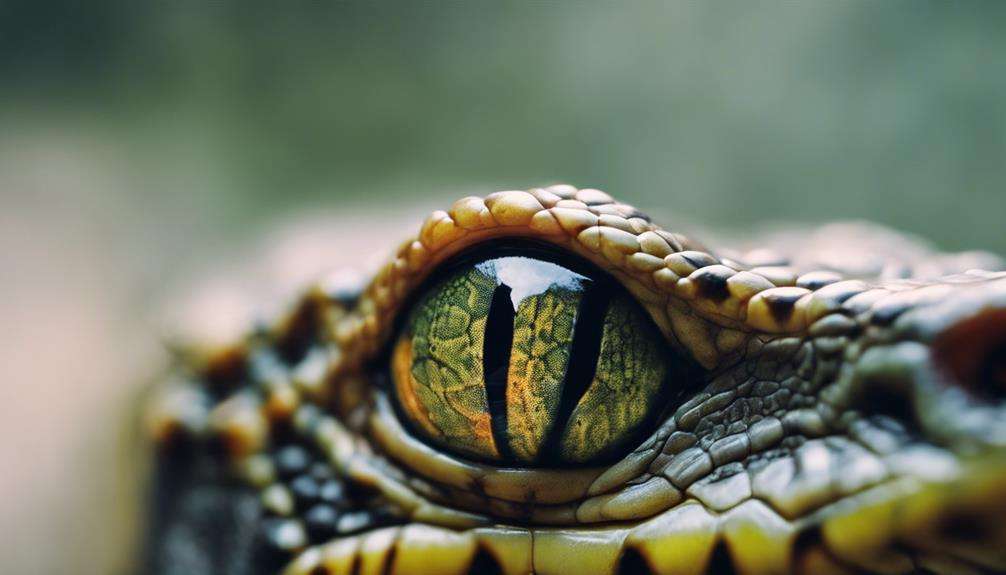
Keep a close eye on your exotic reptile for any changes in appetite, activity levels, behavior, droppings, or physical symptoms as these could be early signs of illness. Here are some key signs to watch out for:
- Changes in Appetite: Refusing food or eating less than usual can be indicative of illness in exotic reptiles.
- Lethargy or Decreased Activity Levels: Monitor for signs of decreased movement or energy, as these may signal underlying health issues in unusual exotic reptiles.
- Unusual Behaviors: Be alert to any changes such as increased aggression or unusual hiding, as these could be early indicators of health problems in exotic reptiles.
- Abnormalities in Droppings: Check for changes in color, consistency, or frequency of droppings, as these variations can be signs of potential health issues in unusual exotic reptiles.
Additionally, keep an eye out for physical symptoms like swelling, discharge from the eyes or nose, or skin lesions, which may require immediate attention from a vet for your exotic reptile's well-being. Regular monitoring and prompt action can help in early detection and treatment of illnesses in your unique pet.
Choosing the Right Exotic Reptile Veterinarian
Seeking out a veterinarian with specialized experience in treating exotic reptiles is crucial to ensure the proper care and well-being of your unique pet. When selecting a veterinarian for your exotic reptile, it's essential to verify if they've access to specialized diagnostic tools that can provide accurate assessments. A knowledgeable veterinarian should understand the specific dietary, habitat, and health needs of exotic reptiles to offer the best care possible.
To find the right exotic reptile veterinarian, consider seeking recommendations from other exotic pet owners or breeders who've experience in this area. These individuals can often point you in the direction of reputable veterinarians who are well-versed in providing specialized care for exotic reptiles.
Regular veterinary check-ups are vital for monitoring your pet's health and addressing any issues promptly. By prioritizing your exotic reptile's veterinary care, you can help ensure a long and healthy life for your unique companion.
Frequently Asked Questions
Why Are Exotic Animals Hard to Take Care Of?
Caring for exotic animals is challenging due to their unique challenges. Specialized care, uncommon needs, costly maintenance, and time commitment are crucial. Understanding their specific requirements is essential for their well-being and longevity.
What Do Exotic Animals Need to Survive?
To ensure the survival of exotic animals, you must provide a proper habitat with the right temperature and humidity levels. Tailor their diet to meet specific nutritional needs, handle them gently, monitor their health, and offer environmental enrichment.
Should Exotic Reptiles Be Kept as Pets?
Keeping exotic reptiles as pets raises ethical considerations due to the impact on wildlife conservation. Legal restrictions exist to protect both animals and owners. Behavioral challenges, financial responsibilities, and health risks necessitate thorough research and commitment for responsible ownership.
What Exotic Animal Is Easy to Take Care Of?
Looking for an easy exotic pet? Leopard geckos are low maintenance, beginner-friendly reptiles with unique care needs. Provide proper heating, humidity, and hiding spots. With simple husbandry tips, they can thrive and live up to 15-20 years.
Conclusion
Now that you have the tools to care for your unique exotic reptile, remember to approach their well-being with the same dedication as a gardener nurturing delicate flowers.
By following these tips and staying attuned to their needs, you can create a harmonious environment that allows your special pet to thrive.
Remember, your commitment and compassion are key to providing the best care for your exotic reptile companion.
